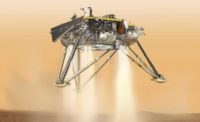With a consortium of eight U.S. companies that includes automakers and aircraft engine manufacturers, researchers at Sandia National Laboratories are studying an emerging manufacturing technique called Cold Spray.
In Cold Spray, microscopic powdered particles of metal or other solids are injected into a supersonic jet of rapidly expanding gas and shot at a target surface. When these 10- to 50-micron particles hit the substrate, they splat so hard they stick--like a bug on a windshield.
The technique is similar to thermal spray processes, in which the sprayed materials are heated to a semi-molten state. However, thermal spray processes were problematic, because the "splats" contracted slightly as they cooled. This created residual stresses or flaws at the interface that can cause defects later.
Cold-sprayed materials remain at or near room-temperature until impact, slamming into the substrate so fast (500 to 1,500 meters per second) that a tight bond is formed without the undesirable chemistry changes and stresses associated with conventional thermal spray processes.
Although the science behind this bonding process is not yet well-understood, the researchers think the high-velocity impact disrupts metal oxide films on the particle and substrate surfaces, pressing their atomic structures into intimate contact with one another under momentarily high interfacial pressures and temperatures.
Consortium members plan to use the Cold Spray process to create tough new coatings on automotive and aerospace engine components made from light-weight composites. They also want to use the process to deposit layers of conductive materials onto substrates for use as heat-tolerant underhood automotive electronics.
Other possible uses of the technique include fabricating small, low-defect parts, joining chemically dissimilar materials with bonds that gradually transition from one material composition to another, and as a low-temperature alternative to welding.
Consortium members include Alcoa, DaimlerChrysler, Ford Motor Co., Pratt & Whitney, Praxair and Siemens.






